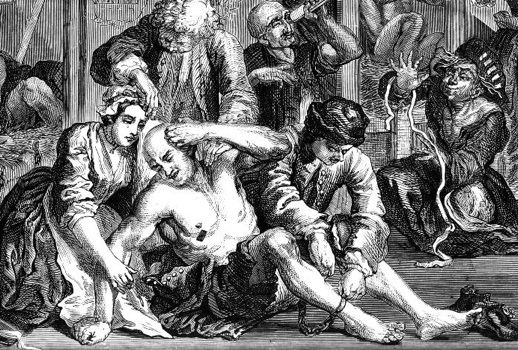

You’ve seen the ads. The Opera Company of Brooklyn (hereinafter OCB) plans to host some 200 different operas in the space of three years, aiming for a berth in Guinness. The list of operas—alas, until well into 2017, they have only scheduled works I’ve already heard somewhere or other—is certainly ambitious. There had to be a gimmick, so I trundled off to the scene of the crime to check it out, deerstalker on head, magnifier in hand. The work I chose from their extensive list was Stravinsky’s The Rake’s Progress, in part because it seems so very unlikely a choice of opera for so unoperaphile an audience. Not much to hum here.
The company’s location may once have been in Brooklyn, around 1998, but nowadays performances are given at the commodious (for New York) flat of its artistic, general and music director, Jay Meetze in distant Inwood, about as far northwest in Manhattan as you can reside and still have dry feet. There’s a piano and a lot of casual seating. There are gracious nibbles, sometimes wine—admit it, you’ve often been sorry you didn’t have popcorn at the opera—and there are no sets or costumes. There’s a corporate sponsor, but the hard-sell was brief and low key.
There were ten singers in Rake, the leads all joining choruses when needed. (Much of the score was cut. All the recits.) The singers gathered here, there and everywhere from a city bursting with ardent vocal talent yearning to breathe free and show what they can do. There is no staging, so I’m not sure this counts as attending an opera performance—it’s more like a read-through in full voice. The singers have two days of rehearsal (“I use terrible language at rehearsals,” says the maestro) and do not get paid.
Meetze insisted none of them knew the roles before they joined the cast, which is quite astonishing, as Stravinsky’s unpredictable melodic lines and jagged harmonies are not easily conned. I could have done with more storytelling, some statement of change of scene—Baba the Turk should, at least, wear a beard—but those of the audience new to this work (and to opera in general, I overheard some saying) were studying the detailed synopsis in the program and remained rapt.
The delight of this sort of thing is sensual: Either you like having opera-large young voices hurling the music in your face close up or you do not. Probably many people, even many who go to lots of opera, do not often experience it thus. Such things give me great pleasure. If you want sets, costumes and an orchestra, you must catch the opera at a company prepared to afford such extravagance. The Met, for instance, gave three splendid performances (and a dress rehearsal) of The Rake’s Progress last spring, and it was the crown of their season.
The cast of last Saturday’s Rake were astonishingly proficient for the amount of time invested. Tom Carle sang Tom Rakewell with clear diction, earnest self-confidence and a hearty, assertive tenor. I like loud singing, but in Carle’s case, I would have preferred some change in dynamics, some lighter or more lyrical side to express Rakewell’s occasional uncertainty or regret.
Stacy Dove sang Anne Truelove with a plush, dark soprano, elegant ornaments and a glide to a golden top C at the end of “I go to him” that was a model of bel canto grace. It’s not her fault that Anne’s lullaby in the asylum, which can be deeply affecting, was so rushed by the music director that she had no room to be tender.
Scott Thomas, who sings such roles as the Count and Belcore, which may indeed suit his pleasant baritone, had the power but lacked the weight for Nick Shadow. He was just not diabolical or even saturnine; the sinister double-meanings of his lines did not come through and Tom surely should not drown his devil out! David Charles Tay produced a deeper and steadier sound in the tenor role of Sellem, the auctioneer.
Laura Smith’s Baba the Turk, though beardless, sang with a thrilling power, if lacking the character’s humor—but so much of Baba’s role is enhanced by sight gags, she had little opportunity to put them over. Mary Brown Bonacci as Mother Goose and Ross Crolius as Squire Trulove ably filled out the cast. The piano was well played by Jestin Pieper.
A word here about hearing an opera performance with only a piano to provide the orchestra. As a frequent attendant of pint-sized opera (and music-theater) companies, I’ve been as startled by what works (Mignon, Jenufa, Don Quichotte, Il Pirata) as disappointed by what did not come off in such circumstances (Les Huguenots, Fosca, Rinaldo). Scores vary from the “big guitar” effects of early bel canto to the rich sonorities of verismo.
The Rake’s Progress, as this performance made clear, is as much a work of orchestral craft as of sung drama. The music follows traditional, mostly eighteenth-century, forms precisely because it is, like the libretto, sending them up. The music alone, however well sung, does not provide insights to personality and play; the singers, though they must present themselves by acting as well as voicing the music, are part of a series of effects, of witty commentary on tradition.
Omit either half of this fabric and the opera tends to evaporate as a more naïve or more sincere melodrama would not. You need those celli and that trumpet and the oboe in The Rake’s Progress where, in a bel canto vehicle, you only require the voice and a cueing chord. But I did not realize this quite so entirely until I’d heard OCB made the experiment. I shall go again.























Comments